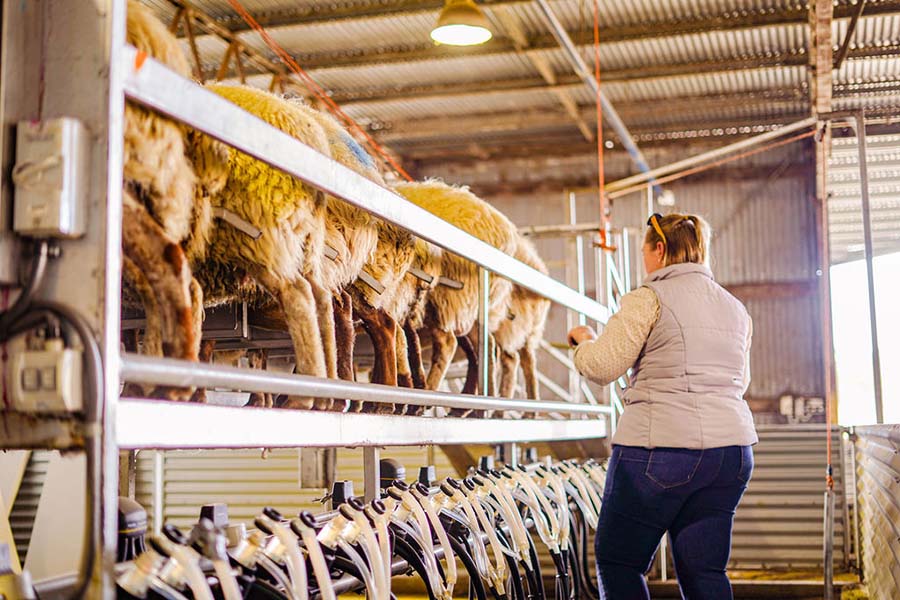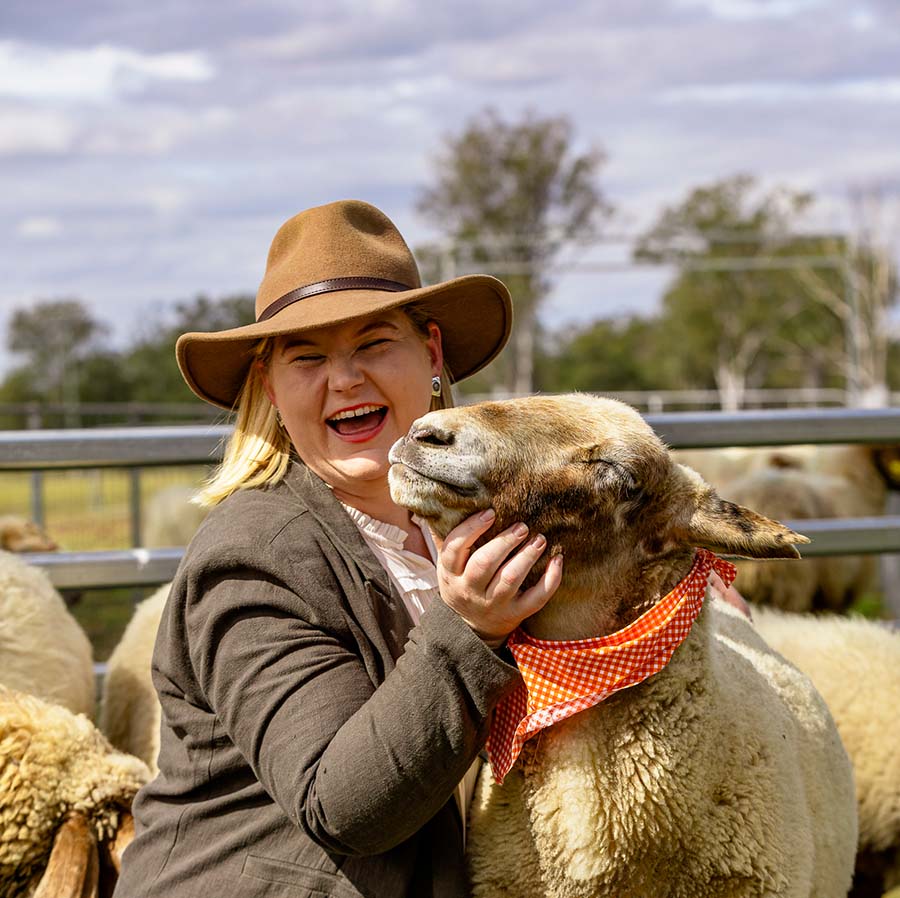
Just an hour and a half from Brisbane, amongst open plains dotted with long-eared, brown and white Awassi sheep, is Towri Sheep Cheeses, a sheep dairy and popular tourist destination.
Somewhere around here, you'll find Dallas Davidson. She might be doing anything from milking the sheep to wrangling busloads of tourists, hosting events and parties at the Towri homestead, or selling cheese at the on-farm shop.
What started as her mum Carolyn's hobby of making gourmet cheese has grown into a full-time Agritourism destination. After making the decision to head home through the drought around 2019, Dallas could see there was a spot in the family business to add her marketing background and bring a spark to the family business. She had a vision to make the family farm a 'destination' and not just a 'stop,' as a way to offset the price of feed for the livestock, as well as a way to bring customers to the product. Dallas loves inviting visitors onto her family property and also sees Agritourism as a way to bridge the gap between farmers and consumers.
'[Some tourists have] got no idea that you can even milk a sheep, you've still got kids who think that milk comes from a carton in a shop,' Dallas said. 'It's a big responsibility, and Agritourism operators live and breathe education.' If this sounds like you, and you're interested in diversifying your business into Agritourism, these are Dallas's top 5 things to consider as you get started.
1. Location location location
It's a simple but important prerequisite to starting- but just where is your farm, and how far away is it for tourists to get to?
'The further away you are from the areas tourists come from, the more you need to offer, because you become a destination, not just a stop.'
For Dallas, being in the Scenic Rim is close enough that tourists can travel from Brisbane or the Gold Coast for a day trip, but she wants to make the journey worthwhile. 'If you are over an hour's drive, that's a long way for people who aren't used to driving that far,' Dallas said.
'The further away you are from the areas tourists come from, the more you need to offer, because you become a destination, not just a stop.' To ensure people are willing to make the journey to your property, Dallas says you need to make sure there's plenty to keep tourists entertained to make up for the travel time. If you're far from a town, do you consider providing accomodation? Accommodation can be anything from a camping ground to glamping or a farm stay.
Dallas says camping in particular is having a moment in the Agritourism sphere.'People are loving camping because prices for accommodation are just skyrocketing. They're getting outside of their comfort zone and they're embracing it,' she said.
2. Point of Difference
As Agritourism grows in popularity, what would make your business stand out from the rest? Dallas says finding a point of difference for your business can be hard when you see your farm every day. You might take what makes it so special for granted.
'It could be something as simple as beautiful roses. Or even just space,' Dallas said. To find that point of difference, Dallas says she regularly communicates with her customers to find out what they love about their visits. 'You take everything for granted because you see your farm every day,' Dallas said. 'But when someone who is used to the hustle and bustle of the city, or lives in town and doesn't have time to simply stop and smell a flower, they could potentially love just that about your farm.'
3. Return on investment
Ensuring a return on investment is vital for any business, and farming in general, but Dallas says it's easy for people in Agritourism to fall into the trap of spending more money than they earn.
Your business needs to make money; it shouldn't become an expense.
'Your business needs to make money; it shouldn't become an expense.' Dallas says it's easy to keep investing in projects that don't guarantee that they will be hits with tourists. 'If you're investing more in something for your tourists or if you keep building things because you think it's going to make a better experience, you've just got to take it easy,' she said. 'See if something works first, and then expand. Don't rush into anything.'
Ensuring a return on investment is often easier said than done in the business world, and Dallas says she has had plenty of trials for expansion that haven't worked, and had plenty of 'fails.' Dallas says it comes back to finding your business's point of difference, which may be something cheap and easy to set up.
4. Work with your local council
Policy and regulation in Agritourism vary from state to state in Australia, with New South Wales leading the charge to simplify red tape- in December 2022, planning reforms were introduced to make it easier for landowners to use their land for things such as farm experiences, cellar doors, event hosting, and roadside stalls.
In Queensland, Agritourism is governed by local councils, so the rules and regulations vary from region to region. But Dallas says the key areas councils want to check are whether a site has enough toilet facilities and a waste management plan. Businesses may also need a tourist facility licence or permit.
While there may be some red tape to wade through, Dallas says overall, councils are there to help. 'From a local tourism point of view, your local council, if you're bringing tourism into the region, of course, they're going to like you.' Tourism advocacy website TilmaGroup has a state-by-state guide to show what support is currently available to develop Agritourism around Australia. In Queensland, the QFF (Queensland Farmers' Federation) put together an agritourism peak body, which launched in June 2024.
5. Accessibility
It wasn't the first thing that came to mind when Dallas was setting up her tourism business, but she says accessibility and parking are now some of the most important things she takes into account when planning expansions.
Space for buses to park and turn around is vital, and Dallas says a good flat area for guests to comfortably climb up and down into the bus makes life easier for everyone. 'Buses, especially for retirement villages or retirement homes, they're probably the bread and butter for an Agritourism establishment,' Dallas said.If your business has accessibility for buses, Dallas says they can provide a stable form of income for an Agritourism venture.
'You already know the number of people, you already have a booked date, and they're on a schedule, too, so generally they're there for two hours and then they're gone,' Dallas said. 'So once they're gone you can get back to your farm work by the afternoon.'
Maintenance of roads and parking spaces is important, too. A few days of rain may be enough to prevent your clients from reaching you, so trying to prevent that can pay dividends. While accessibility wasn't on the Davidson's radar when they first started, she wishes they had been more organised from the beginning. 'A large part of our population live with a disability, so it's so important to recognise that and make sure your establishment is accessible for them to enjoy,' she said.
Final tips:
Whether you're selling a product or an experience on your farm, building a brand will help bring customers and create return customers. Over the pandemic, Dallas and Carolyn had to pivot, and since they couldn't have guests visit in person, they hosted online 'wine tastings,' where they went live on social media and chatted to people about what they were up to.
Doing this kept them front of mind for future visitors, and built a relationship with potential customers. They built a loyal customer base, and in turn were supported by their customers buying products online and visiting the farm once travel was again allowed.
'It does take time. Rome wasn't built in a day. You've just got to take time with it because that's what makes it a sustainable business,' Dallas said.



